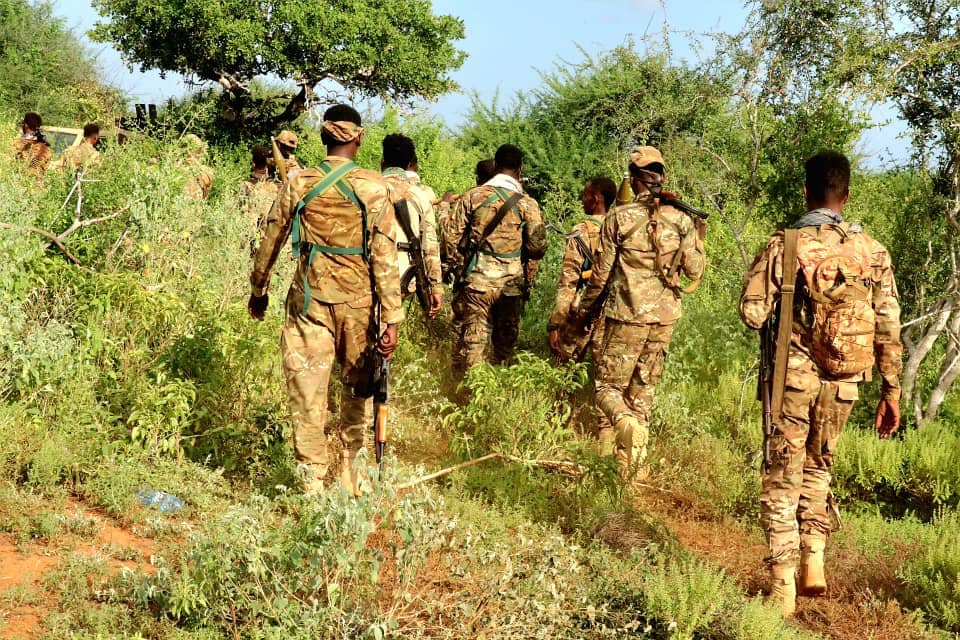Monday July 22, the Somalia National Army and Jubaland Security Forces, supported by Kenya Special Forces, neutralized 103 al-shabaab militants and captured 28 others when the terror group attempted a coordinated dawn attack at four different regions in Somalia, namely Harbole, Mido, Bulo Haji and Bar Sanguni. A fierce battle ensued for the better part of the morning as government forces and allies repulsed the militants. When the guns finally fell silent, several AK47 assault rifles, machine guns and rocket propelled grenades lay strewn on the ground left by dead and retreating militants.
Some two days later, on Thursday July 24, another attempt by the terror mongers in a hotel in Mandera town was unsuccessful when an IED placed in a hotel frequented by security officers exploded prematurely.Some four civilian hotel staff and a police officer who were dining at the time of the incident sustained injuries and were rushed to Mandera County Referral Hospital for treatment. Sources in the country’s multi agency security services indicate they are in hot pursuit of the perpetrators and it is only a matter of time before they are apprehended.
As we reflect on these events, it becomes evident that al-shabaab is facing unprecedented challenges, and it is crucial to examine why this is happening. First, there is a clear change in tactics and strategies. Kenya's security forces have clearly demonstrated a shift towards more effective tactics and strategies in combating terrorism. The recent operations in Somalia, supported by Kenyan Special Forces, highlight a coordinated effort that leverages intelligence, rapid response capabilities, and latest military technologies to provide better battlefield awareness. This coordinated approach has disrupted al-shabaab's operational capabilities, weakening its ability to launch large-scale attacks.
Moreover, the success against al-shabaab is not solely attributed to Kenya's efforts. There is obvious enhanced regional cooperation at the strategic and operational level. Collaboration with the Somalia National Army and Jubaland Security Forces, as well as support from international allies, has played a pivotal role. Such alliances have bolstered intelligence-sharing mechanisms, strengthened border security, and provided essential resources for counter-terrorism operations. The joint efforts have created a formidable bulwark against terrorist activities, making it increasingly challenging for al-shabaab to operate freely in the region.
The recent military operations targeting al-shabaab strongholds in Somalia have been marked by precision strikes and intelligence ledassaults. The ability to disrupt terrorist activities at their source has significantly degraded al-shabaab's command structure and logistical networks. The ability of counter terror operatives to attack from ground and air assets increases the physiological pressure on the militants,leaving in fear of imminent attacks from either avenue. The capture of militants and the recovery of weapons caches not only weaken the organization's operational capacity but also diminish its morale and propaganda efforts.
Instructively, Kenya's decisive actions against terrorism have garnered strong public support and confidence. The successful thwarting of attacks and the commitment to pursue terror perpetrators and their sympathizers have reassured citizens and bolstered their trust in the security forces. This trust is crucial in maintaining unity and buildingresilience against terrorism, as communities actively collaborate with security agencies in a whole of society approach to tackling the terror scourge. Beyond the physical battles, al-shabaab is also facing a psychological and ideological defeat.
Such successes by security agencies underscore a critical turning point in the fight against terrorism in the region. The diminishing influence and effectiveness of al-shabaab can be alluded to the militants violent, indiscriminate targeting of civilians which has increasingly alienatingpotential sympathizers and recruits. The narrative of resistance and heroism that once attracted disillusioned youth is now overshadowed by the reality of defeat and isolation.
But then, there are opportunities for rehabilitation and reintegration!
For Kenyan youth who may still be swayed by extremist ideologies or tempted to join al-shabaab, the recent events present a critical opportunity for reconsideration. The demonstrated resilience of Kenya's security forces and the international community's support offer a pathway for individuals to disengage from violent extremist ideology. Programmes focusing on rehabilitation and reintegration under the National Counter Terrorism Center, coupled with community support initiatives, provide a viable alternative to disengagement. As al-shabaabfaces mounting pressure and dwindling resources, the futility of continued resistance becomes apparent.
For young individuals still within the ranks of al-shabaab, the writing is on the wall: surrendering now offers a chance for a future without violence, contributing positively to society, and participate in the ongoing efforts to build peace and stability in the region.
The recent successes against al-shabaab by Kenya's security forces, therefore, brings to the fore a significant milestone in the fight against terrorism. The victories against the militant group demonstrates that peace and security can prevail when communities unite against extremism. Let us continue to support our security forces, advocate for peace, and extend a compassionate hand to those who seek a way out.
Together, we can ensure that Kenya and its neighbors thrive in a safe and secure environment free from the threats of terrorism.
